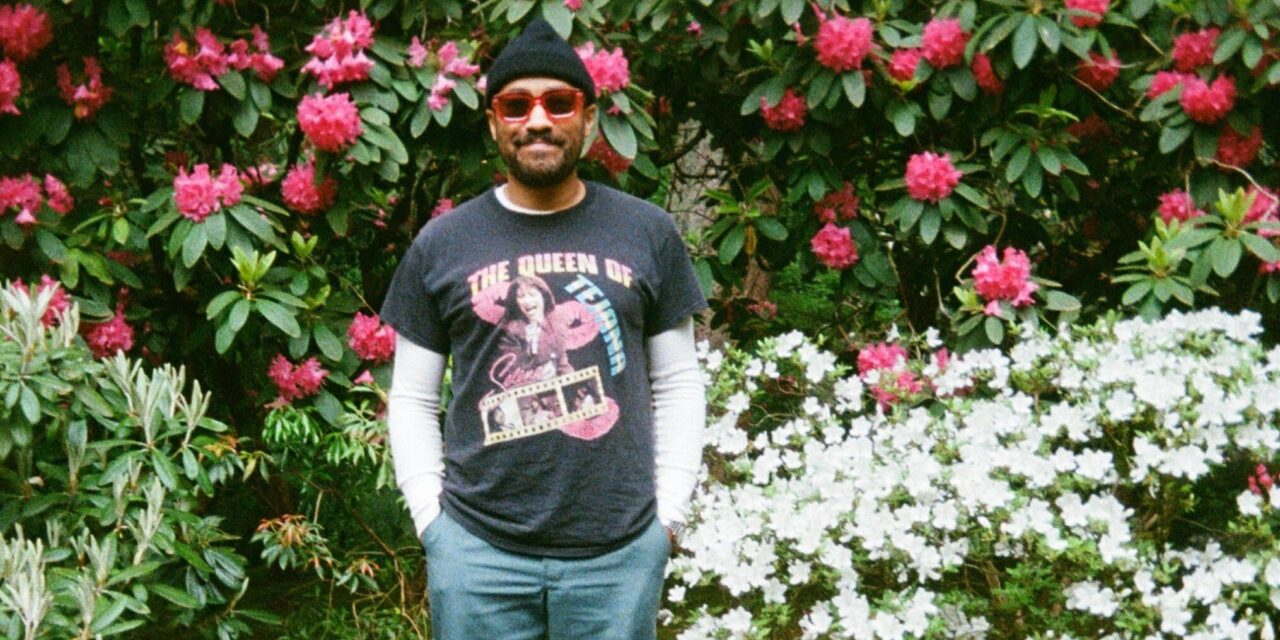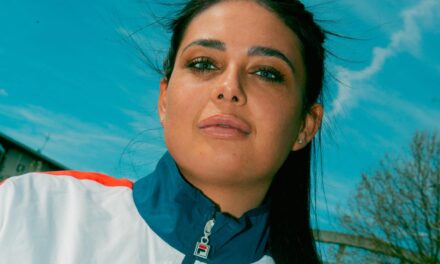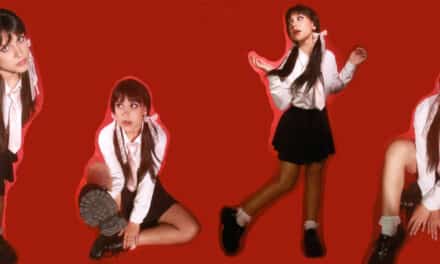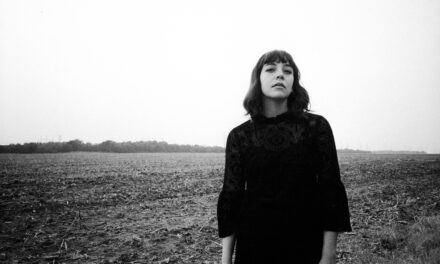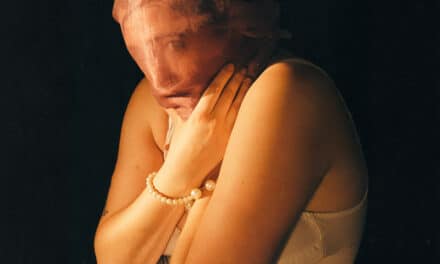Photo credit: Kassy Balli
On August 15, San Gabriel will release their debut album Nights and Weekends on Seattle-based non-profit label Share It Music (pre-order). In support of Share It Music’s mission, a portion of proceeds from the album will be donated to San Gabriel’s chosen charity, HAAM (Health Alliance for Austin Musicians), a nonprofit providing access to affordable healthcare for Austin’s working musicians.
“‘Alone In My Room’ was written just after I left my former band, Whiskey Shivers. We had a record deal offer and a summer EU/UK tour lined up, but by then, the touring lifestyle had become more about wild partying and chaos than music—and it no longer felt safe or healthy for me.
To make ends meet, I took a job at a liquor store in East Austin. Luckily, my boss was supportive, letting me write and record music during my shifts—as long as the shelves stayed stocked—and even come in on Sundays when the store was closed to work on my songs.”
“Alone In My Room” isn’t just a title—it’s practically a thesis. What did isolation reveal to you that a packed tour bus never could?
I think isolation provided me with some much needed time to reflect on my goals as an artist, but also as a human. Though touring is a lot more isolating than you might think, it doesn’t exactly provide a lot of time for reflection.
It also gave me time to reflect on my values as a human being in the world, and I think out of that I gained a lot of clarity in terms of where I want to put my energy both professionally and personally. I think part of that process was writing a lot of songs, and new music, which helped me process a lot of those emotions.
Your album is literally named after working retail—Nights and Weekends. What does punching a clock do to a dream?
I’m pretty lucky that in my case it strengthened it, but I won’t say it was easy to hold onto. At the time I started, I had a paralyzing fear of showing people music, and was at a crossroad in my life where I told myself that if I was going to take what we musicians call a “straight job” that I’d have to get confront this fear of showing folks my music.
I’m pretty lucky that the owner Billy was cool, and as long as the shelves were stocked, I could work on my music. Which a lot of times meant staying late after work, coming in early, or coming in on Sundays when the shop was closed.
I think maybe to some outside folks, it may have looked insane to think I could record something in a liquor store and release it to any success, and maybe it is, but I was then, and am now pretty determined. Additionally, there are a lot of Austin musicians who work in the service industry, so we kinda have this “us against the world” mentality.
Stocking shelves while secretly recording synth-pop heartbreak anthems sounds like a 21st-century Springsteen lyric. Was the liquor store your studio, your escape, or your purgatory?
Hahaha that’s awesome it totally does.
The liquor store was kinda my everything. And maybe that sounds weird but I really viewed a lot of those folks as family. East Austin had a really stellar community at the time. I think if it weren’t for that job, I might have been pretty lonely, and I don’t know that I’d be doing the music that I am now.
East Austin is a pretty unique neighborhood. There was a carwash on the same street, with employees who would come in and freestyle rap and we’d take shots of Paul Masson. There
was a bar next door called Nickel City and those folks would come in and play my guitar or ask what I was working on. I met Christian Bland (one of my favorite guitarists) from Black Angels in there and we would talk about guitars and amps. Just had a lot of folks coming through who were really encouraging.
It was just a really cool and unique time. It’s somewhat difficult for me to talk about, but at the time I was really struggling with anxiety and depression and self-worth as I was making this transition from touring to the 9-5 world. Before taking a job at the shop, my anxiety would be so bad that I couldn’t get myself to go to the grocery store during the day. I just kinda felt paralyzed.
Working at the shop gave me a reason to get into the world and interact with people and I feel like that community gave me a really soft landing when I’d come off the road and when I left Whiskey Shivers. I felt really welcomed, and I felt like people really looked forward to seeing me, and me to seeing them. I realize it was just a 9-5 job, but it really was a special time with a lot of really awesome people and I’m really thankful for it.
Leaving Whiskey Shivers meant stepping away from the chaos, but did any of that chaos find its way into San Gabriel’s sound—or did you shut the door on it completely?
I have a lot of internal chaos, just like, normally. Like just typing this out I have exactly 1000 thoughts going through my mind. My mind is like one of those 80s fisher price vacuums that when you push it the balls bounce around. But when I do music I can be 100% focused. I think my music has an edge to it that is reflective of that. I think it’s not quite happy, not quite sad. Just not quite one emotion or the other.
You’ve worked with names like DJ Khaled and Anna Kendrick, but Nights and Weekends feels like the anti-Hollywood record. How did you unlearn the polish?
I think I never learned the polish. I think in that case with Shivers, a lot of that was having good arrangement skills and smart production choices. And all of those dudes were super talented in their own right. That stuff was also expertly recorded by very talented engineers.
One thing, I will say, is that one of our singers lost their voice (too much partying, something which would become more regular after this) and his scratch vocal, which was record through a Shure SM 58 ($99 microphone, considered extremely lo-fi) turned into a final vocal that made its way onto the soundtrack. That taught me that audio fidelity isn’t crucial in “good music.”
I will say, my goal of my music is to express how I feel, which oftentimes isn’t one certain way. And I like the sounds and melodies in my songs to reflect that. I think it can be a sort of determine your own adventure in what instruments you want to listen to. I also enjoy the mix sounding a little distorted and crazy. I don’t feel like an over-polished record would be representative of who I am as a person, and just wouldn’t feel right.
There’s a kind of optimistic ache to your music—like dancing while staring at the exit sign. Do you write songs to get free, or to stay grounded?
Yeah totally. I’m a pretty sensitive dude, and I can feel one thousand ways at a time. Though I wouldn’t necessarily consider myself an optimist, I will say I aggressively seek beauty in the world, and I believe in a really wonderful future. I call my music “optimistically melancholic.” Like sad dance music.
I kinda just write whatever I’m feeling. Oftentimes it just feels like random words, but then maybe a few months later I’ll listen to the song and think, “oh yeah that’s what I was going through at this point in my life.” I think what I’ve realized at this point is that writing music is the way that I process my feelings and my place in the world.
You’re donating part of the album’s proceeds to HAAM. What does it mean to you to tether this project to something tangible and human like healthcare for musicians?
Well, first off, shout out HAAM. HAAM helps Austin musicians who otherwise could not afford health insurance get insured. And I’m one of them. I’ve had 2 seizures, the first time, I did not have health insurance, and wasn’t able to get the followup care I needed, and the second time, I did and HAAM was a HUGE help in that. A big part of their mission is also mental health treatment and counseling, which is something we don’t talk about nearly enough. By this point I know most of the folks working at HAAM, and they’re all stellar and lovely people. It means the world to me that I can play a small part in their mission in keeping Austin musicians healthy both mentally and physically.
“Running Out of Time” feels like a ticking clock wrapped in glitter. What’s chasing you creatively right now—what are you running from or toward?
I think at the time I was trying to write myself out of a certain life or lifestyle. I knew I didn’t want to tour in a constant state of people around me snorting whatever, or people crashing the van drunk. I’d seen enough of the world to know that I wanted to see a lot more. One of the best things I’ve learned from touring is that the world is wide and beautiful, and there are so many cool and interesting people. I just want to make the best art that I can and make friends along the way.
Growing up, music was such a source of identity and like a best friend to me. I didn’t really fit in as a young person (or as an adult I guess) and I feel like music was always the friend that I could keep in my backpack and listen to and feel understood. Like it was such a source of comfort for me as a young person.
Part of the deal I made with myself when I decided to leave shivers was that I would do everything I could to make the best music that I could to try to give, even if it’s just one person, a shelter like I had from music, and if not, maybe just something to dance to. Like, I feel that if I’m going to call myself an artist, I have a responsibility to people to do my best to try to give them something that will help them. I don’t know if that makes any sense.
Between East Austin and Ashland, from synthwave sadness to studio assistant at The Oddio Shop, your path isn’t exactly linear. Does that ever feel like a liability—or is it your secret sauce?
Certainly not linear. And you know, I don’t know. I’ve been fortunate to have had a lot of insane and wonderful experiences in my long time as a musician. My first tour was in a vegetable oil powered mini-bus across the US with some of my best friends. I became a banjo player in a punk rock bluegrass band and somehow ended up in a Hollywood movie with some of my best friends, which wasn’t something I expected in my wildest dreams would ever happen. And now I’ve finished my first record, and I’m touring with Goth Babe playing guitar and synth and singing backup vocals, and once again touring with some of my best friends. I’ve learned to not expect anything but to try to be ready for anything.
One of the things I’ve learned along the way is to trust my gut and run my own race. I have friends who were in a band called Passion Pit, who blew up immediately, and I have friends that were in other bands like Cranewives, Buffalo Nichols, or Phillip Michael Scales, who have taken a more circuitous route to success.
Recording a record in a liquor store wasn’t necessarily on my “music career bingo card”, but I’m scrappy when I need to be, and it’s what I had to do to continue making my art, and I’m really proud of the music that I made there. It’s opened up a lot of doors for me that I’m really excited about.
I think if I have any secret sauce it’s an unwillingness to give up.
Let’s say Nights and Weekends is a voicemail you leave to your past self, right after quitting the band. What does it say, and how long before you hang up?
(Gosh these are really great questions)
Funny you should say that. I kinda think of Nights & Weekends as a letter to my past self.
I was always so afraid of putting myself out there, because I don’t really fit the mold of whatever you think when you envision a banjo player or a synth-pop musician. (Unfortunately that’s been made abundantly clear to me)
But, one of the things I’ve learned through this whole process of releasing music, is that people really want to see you win. I’ve gotten messages from musicians I admire saying they love watching the progress, or that they like my songs or whatever, and I’ve made new friends with all sorts of new people, and my life has been so enriched by the decision or risk to put myself out there and just go for it.
So I’d tell my younger self: “bet on yourself, follow your gut, and work really hard. Good luck buddy.”

